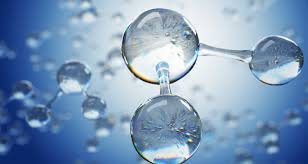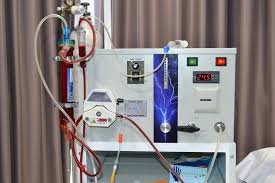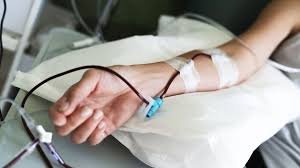Ozone Therapies
What is Ozone Therapy?
- All intravenous ozone therapies require a blood test prior to administration to check for G6PD enzyme, as individuals with a glucose-6-phosphate dehydrogenase deficiency may experience acute haemolysis upon exposure to ozone.

Ozone Molecule: Exploring its Nature and Characteristics
- The ozone molecule is a natural but inherently unstable compound. Pure ozone gas possesses a soft sky-blue hue and emits a distinctive pungent odor. Comprising three oxygen atoms, ozone is distinct from its more stable counterpart, diatomic oxygen, which is the most abundant form of oxygen in the atmosphere.
- Monoatomic Oxygen: A highly reactive and unstable form of oxygen containing two free covalent bonds, making it prone to rapid chemical reactions.
- Diatomic Oxygen: The prevalent form of oxygen, stable and less reactive compared to its monoatomic counterpart.
- Ozone: With its three oxygen atoms, ozone possesses a free bond, contributing to its high reactivity and powerful oxidizing potential.

Ozone's Effects:
- Antimicrobial Action: Ozone interacts with microorganisms by oxidizing their cell membrane lipoproteins, disrupting enzymatic functions, and damaging viral capsids, thus inhibiting their reproductive cycle. It also modulates immune cells, enhancing phagocytosis.
- Immune Modulation: Ozone dissolves in plasma water, generating hydrogen peroxide and reactive oxygen species, which trigger immune responses by increasing interferon, TNF, and IL-2 production. It reduces proinflammatory cytokine levels, such as IL-6 and TNF-alpha.
- Antioxidant Activity: Ozone induces mild oxidative stress in plasma, activating the Nrf2 pathway and increasing the expression of antioxidative enzymes and heat shock proteins.
- Enhanced Oxygenation: Ozone stimulates red blood cell glycolysis and the Krebs cycle, leading to increased oxygen release in tissues and ATP production.
- Wound Healing: Ozone-activated platelets release IL-8, promoting leukocyte migration, collagen deposition, and wound healing.

Ozone Therapy may help in most conditions as most diseases involve oxidative process :
- Infectious Diseases: Effective against acute and chronic bacterial, viral, and fungal infections, including antibiotic-resistant pathogens. It improves metabolism and immunological functions.
- Skin Conditions: Ozone therapy is used for herpes zoster, abscesses, athlete's foot, atopic dermatitis, eczema, urticaria, psoriasis, wounds, and ulcers due to its antimicrobial, immunoregulatory, antioxidant, vasodilatory effects, and epigenetic modifications.
- Diabetes: Ozone therapy may help manage vascular and neurological complications in both type 1 and type 2 diabetes.
- Cardiovascular Diseases: Ozone therapy has shown promise in treating some cardiovascular conditions
- Orthopedic Conditions: For orthopedic ailments like osteoarthritis, radicular conflicts, disc herniation, and lumbago, ozone therapy, including ozone disc nucleolysis, presents an effective treatment option.
- Respiratory Diseases: Ozone therapy can effectively address acute respiratory distress syndrome, chronic asthma, COPD, and idiopathic pulmonary fibrosis by relieving bronchospasm, releasing vasodilators, and dilating smooth muscles to reverse hypoxia.
- Gastrointestinal Diseases: Effective for gastritis, gastric ulcers, and chronic constipation, ozone therapy's anti-inflammatory effects help alleviate symptoms and combat H. pylori infection by increasing the release of secretory IgA by lymphocytes and plasma cells.
- Neurological and Neurodegenerative Diseases
- Autoimmune Issues: Ozone therapy's immune modulatory effects may help auto immune conditions
- Eye Disorders: Ozone therapy has shown some promise in managing age-related macular degeneration, retinal vascular disorders, and glaucoma by reducing inflammation, antioxidation, and improving oxygenation in ocular tissues.
- Cancer: Ozone therapy improves the quality of life and survival duration in cancer patients by enhancing blood circulation, oxygen delivery to tissues, and general metabolism, especially in hypoxic tumor regions. It does not cure cancer its an add on complimentary therapy
Contraindications:
- G6PD deficiency
- Toxic hyperthyroidism, especially in grave status
- Severe cardiovascular instability
- Acute alcohol intoxication
- Acute myocardial infarction
- Massive and acute hemorrhage
- During convulsive states
- Hemochromatosis
- Patients receiving IV administration of copper or iron simultaneously
Cautions:
- Pregnancy, especially in the first trimester- we do not see pregnant patients
- Patients on anticoagulation medications
- Interactions with antioxidants such as vitamin C and E, which should not be used simultaneously with ozone therapy
It's advised to exercise caution and seek medical advice before undergoing ozone therapy, especially in individuals with specific medical conditions or on certain medications.
Types of Ozone Therapy:
- MAHT (Major Autohaemotherapy): involves taking blood approximately 200ml and mixing with saline and heparin to prevent clotting and reinfusing back again after mixing with ozone . Initially done with 100ml blood and after second sitting its done with 200ml blood. This can be repeated 3 times called as 3 pass
- EBOO (Extracorporeal Blood Oxygenation and Ozonation): represents a groundbreaking advancement in the utilization of ozone therapy for the treatment of toxicity and chronic illnesses. It stands as the pinnacle of ozone therapy, surpassing even multi-pass high dose ozone therapy in effectiveness. The distinguishing feature of EBOO lies in its unique combination of ozonation and likely filtration processes. A sophisticated procedure combining ozonation with filtration, highly effective in detoxifying and enhancing oxygen metabolism.
- Rectal and Vaginal Insufflations: Localized ozone therapy for specific conditions.
Pricing:
- MAHT: Starts from £150 for a single pass.
- EBOO: £500 per session. nad/glutathione with b vitamins are normally chosen by many which enhance the effect of EBOO, so additional costs incur. EBOO on its own takes 1.5 to 2hrs including preperation time and intravenous drips take additonal time. We suggest atleast 3-4hrs especially if you plan to come for all including intravenous drips and eboo.
- Rectal/Vaginal Insufflations: £120 each.
- Many also decide to add ultraviolet blood irradiation to Major Autohaemotherapy or EBOO and additonal cost of 70-100 pounds per session is incurred depending on how many sessions are taken. Discounts are available for block bookings of more than 10 sessions
